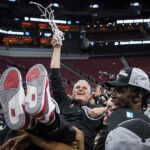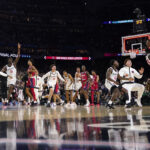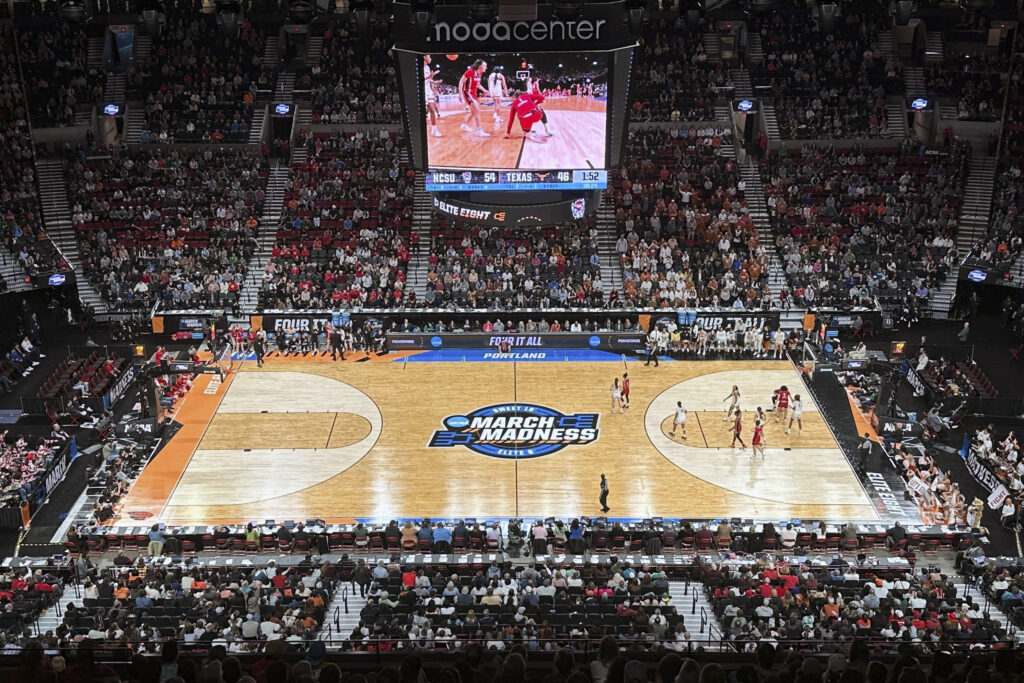For the final Pac-12 season to be considered a complete success, someone needed to represent the conference at the Final Four in Cleveland.
That scenario seemed likely when a record-tying five teams qualified for the Sweet 16 and two, USC and Oregon State, advanced to the Elite Eight.
But the No. 3 Beavers couldn’t pull off what would have been a monumental upset Sunday against top-seeded South Carolina.
As if there wasn’t already enough pressure Monday night on No. 1 seed USC and its superstar, JuJu Watkins, the Trojans carried the weight of the conference on their backs.
Standing in the way of USC’s first Final Four appearance in nearly 30 years: None other than 11-time national champion Connecticut, which was hungry to return to the semifinals after missing out last year for the first time since 2007.
The Huskies had their own superstar, junior guard Paige Bueckers, and were a slim betting favorite despite being a lower seed (No. 3) and having an injury-depleted roster. Perhaps the odds were a nod to UConn coach Geno Auriemma, who was just four wins behind Stanford’s Tara VanDerveer for the most in college basketball history.
Auriemma trimmed that victory deficit to three Monday as Bueckers flashed her experience when it most mattered, scoring 28 points, including nine in the fourth quarter, in the 80-73 win.
So UConn returns to the Final Four for the 23rd time while the Pac-12 era ends without a Final Four qualifier for the second straight year.
Watkins led all scorers with 29 points and added 10 rebounds. In tandem with McKenzie Forbes (24 points), she pushed the Trojans to the verge of their first Final Four since 1986.
Despite missing five injured players, UConn navigated foul trouble and never trailed after taking the lead for the first time at the seven-minute mark of the second quarter.
“We didn’t shoot it as well as we normally shoot it,” said USC coach Lindsay Gottlieb, who was attempting to become the first coach to take two Pac-12 schools to the Final Four. (She led Cal there in 2013.) “I give UConn a lot of credit for that.
“We haven’t been on this stage. Obviously, UConn is a championship team. Maybe there’s some learning of what we have to do there, of what it takes. For the most part, I felt like this was a really good basketball game. They did a little bit better of what they do than what we do.”
The SEC (South Carolina), Big Ten (Iowa), ACC (N.C. State) and Big East (UConn) will be represented in Cleveland. The Pac-12 will simply observe the festivities after spending the season claiming it was the best league.
UConn and N.C. State are also sending their men’s teams to the Final Four — the first time more than one school has accomplished that feat in the same year.
Oregon State pushes South Carolina
Of the other Pac-12 teams in the Sweet 16, only OSU rose above its seed by taking down No. 2 Notre Dame with a 70-65 win. Then the Beavers trailed undefeated South Carolina by just four points with 3:30 remaining in Albany.
But Tessa Johnson converted a 3-point play and the Gamecocks added five free throws to score the final eight points of the game and improve their record to 36-0.
“Just fearless, courageous, together,” a passionate Oregon State coach Scott Rueck said. “Everything that’s right is this team.
“In our sport, where it seems like controversy is the flavor all the time for some reason, and we all have to have something to whine about, this team just keeps it simple and does everything right.
“Everybody needs to get to know this team, everybody needs to watch this team, and everybody needs to be like this team. The world would be better if everyone focused on this instead of a lot of the other things.”
Oregon State won 13 games in 2022-23 and missed the NCAA field for a second straight year. But all the key players returned. Picked by coaches to finish 10th in the conference, the Beavers instead were fourth. They more than doubled their win total (to 27) and reached the Elite Eight for the first time since 2018.
OSU will play at least the next two seasons in the West Coast Conference due to the breakup of the Pac-12. All of Rueck’s players have eligibility remaining; whether some transfer because of conference realignment is to be determined.
“This team, it rivals any team I’ve ever been a part of,” said Rueck, who has coached OSU for 14 seasons. “What they did this year is not common. It’s not normal.
“It’s hard hearing your school talked about the way it’s been talked about and in a way devalued. Clearly, I don’t see it that way, coming back to my school and creating a program that has the ability to fill a stadium or an arena — to turn a community and a region on its ear — has been a dream of mine, and we’ve done that.
“What the value is, I don’t know, but I know the timing of it is really great (for Oregon State).”
Stanford, UCLA fall short of Elite Eight
None of the four teams that earned No. 2 seeds reached the Elite Eight. Those falling short included Stanford, the Pac-12’s regular season champion, and UCLA.
The Bruins led by three points over defending national champ LSU with 2:46 remaining in Albany. The Tigers scored but then called what seemed an odd timeout at 2:26, given that it left coach Kim Mulkey with one remaining.
But the strategy paid off. UCLA scored just two points thereafter, losing 78-69 after LSU closed with a 14-2 run. The Bruins missed out on their first Elite Eight appearance since 2018. They have never made a Final Four.
“I will play this over and over in my head and try to figure out from my perspective how I could have led them better or different,” UCLA coach Cori Close said. “But you’re not going to win games in this level giving up 30 points in the fourth quarter.
“I’m the head coach. I’m responsible. They’re young. I need to lead them better, and I need to lead them into situations where they have the confidence and that we execute in those scenarios. Youth cannot be our excuse.”
Backcourt woes
Stanford coach VanDerveer’s encouraging group text to Pac-12 coaches before the Sweet 16 was well received, but the Cardinal itself needed bolstering in the second half Friday against N.C. State.
The Cardinal led by seven early in the third quarter before a stunning 24-4 Wolfpack run extended into the fourth. Cameron Brink had no fouls in the first half but fouled out with 8:10 remaining, and Stanford couldn’t get within single digits minus the Pac-12 Player of the Year.
Brink played 24 minutes (13 points, nine rebounds) while her frontcourt partner Kiki Iriafen played 23 (26 points, 10 rebounds) due to her own foul trouble. Stanford’s perimeter starters combined for 21 points to N.C. State’s 49.
“We are not going to be successful with Cam and Kiki (Iriafen) on the bench,” VanDerveer said. “We’re not going to beat a team that good. On top of that, we need more help offensively from the perimeter.” The perimeter problems have been a common theme for Stanford since losing Lexie and Lacie Hull and Anna Wilson after the 2022 Final Four.
The 6-foot-4 Brink is moving on to the WNBA, where she’s projected as the No. 2 draft pick (held by Los Angeles) behind Iowa’s Caitlin Clark. But the shot blocker still has work to do staying on the court – she also fouled out in the second round – and expanding her perimeter shooting.
“If I have to lose anywhere, in front of friends and family is the way I want to do it,” said Brink after the loss in Portland, which is near Beaverton, her hometown. “I’m really at peace with my career and how it went.” (Her career includes the 2021 national title.)
The Wolfpack backed up their win over Stanford by upsetting Texas 76-66 in the Elite Eight, thereby taking out the No. 1 and 2 seeds in that region.
In a Sweet 16 rematch, No. 5 Colorado wasn’t as competitive against high-scoring No. 1 seed Iowa as it was last year. Clark dropped 29 points and 15 assists on the Buffaloes and had plenty of help from four other double-figure scorers in an 89-68 win in Albany.
“The hard piece is that she (Clark) got everybody else involved,” said Colorado’s Jaylyn Sherrod, who was among those tasked with defending Clark. “It just speaks to the type of player she is. It’s tough when everybody else is hitting too.”
Coaches, players push back
With women’s college basketball visibility increasing, so has scrutiny over organizational errors, behavior and media coverage. The short-term angst, though, is a longer-term sign of healthy interest in a sport unwilling to accept less than it deserves.
The biggest black eye occurred in Portland on Sunday, when officials discovered that the 3-point line on one end of the court was 9 inches too short at its apex. The N.C. State and Texas coaches chose to play rather than wait an hour for the court to be re-marked.
“We shot the ball better on the other end both games, because that’s the normal line,” Wolfpack coach Wes Moore said. “But I’m not going to blame it on that. I mean, these kids, they shoot so far behind it sometimes nowadays, who knows where the line is? I don’t know that it was an advantage or disadvantage, either way. We both played a half on each end.”
Connor Sports accepted responsibility for “human error” by a contract court finisher, according to an NCAA news release on Monday. The 3-point line was corrected before the USC-Connecticut clash, but only after five games were played with the wrong marking, including USC-Baylor and N.C. State-Stanford.
“Who knows how much it could impact a team?” VanDerveer wrote in an email to Washington Post columnist Sally Jenkins. “You miss shots, people get frustrated. Either way, it is shoddy workmanship and a lack of accountability. When you go to the gym, you trust the line (is) correct and the basket is at the right height. Not a good look.”
Stanford shot 20 percent from 3-point range in its Sweet 16 loss, including a 2-of-13 performance at the end of the court with the short line. The Wolfpack shot 41.2 percent.
There also was controversy in the Oregon State-Notre Dame duel in the Sweet 16, when Irish star freshman Hannah Hidalgo missed more than four minutes of the second quarter when officials required her to have her nose ring removed.
Head decorations, headwear, helmets, and jewelry are illegal per NCAA rules, but Hidalgo had been playing with the nose ring all season — including in two NCAA Tournament games. She finished with 10 points on 4-of-17 shooting, well below her 22-point average.
“I guess it was a point of emphasis in the Sweet 16 with jewelry,” Notre Dame coach Niele Ivey said. “Just wish we could have known beforehand. Can’t control it so we had to move on. But stoppage of play is never great when you’re trying to have flow.”
Hidalgo told ESPN that an official told her she could play with the nose ring provided it was covered with tape. When that changed after the first quarter, she was on the bench until trainers could figure out how to remove the diamond stud.
“I thought it was B.S., because I’m on a run, I’m on a roll,” Hidalgo said. “I scored two baskets and then having to sit out for all that time, I was starting to get cold. I think they (officials) were worried about the wrong things. They should have (refereed) the game.”
But that wasn’t the only controversy. A column published in the L.A. Times prior to the UCLA-LSU was harshly criticized for how it portrayed the teams as good (UCLA) and evil (LSU), including a description of the Tigers as “dirty debutantes.”
LSU coach Kim Mulkey and some of her players angrily responded in postgame comments.
“I’m not going to let you talk about 18- to 21-year-old kids in that tone,” Mulkey said. “It was even sexist for this reporter to say UCLA was milk and cookies.
“I know sexism when I see it and read it. That was awful.”
LSU guard Hailey Van Lith told reporters Sunday: “We do have a lot of Black women on this team, and unfortunately, that bias does exist still today, and a lot of the people that are making those comments are being racist towards my teammates.”
UCLA’s Close reposted the column on social media, then apologized after only reading the headline. Close explained that she made a “huge mistake … I would never want to tear down a group of people in our great game.”
The L.A. Times later revised the column, adding an editor’s note: “A previous version of this commentary did not meet Times editorial standards. It has been updated.”
*** Send suggestions, comments and tips (confidentiality guaranteed) to pac12hotline@bayareanewsgroup.
*** Follow Metcalfe on Twitter/X: @jeffmetcalfe
*** Follow Jon Wilner on Twitter/X: @WilnerHotline
*** Pac-12 Hotline is not endorsed or sponsored by the Pac-12 Conference, and the views expressed herein do not necessarily reflect the views of the Conference.
Related posts:
 Pac-12 basketball: Hot Seat update as the conference season begins
Pac-12 basketball: Hot Seat update as the conference season begins

Arizona State guard Frankie Collins, Jan. 14, 2023. (AP Photo/Amanda Loman)
Pac-12 rewind: UCLA sweeps, Utah stumbles, ASU keeps pace and Oregon’s wild ride rolls on
(AP Photo/Mike Stewart)
Pac-12 expansion: San Diego State reaches the Final Four and stamps its credentials for membership
(AP Photo/David J. Phillip)
Jon Wilner: SDSU’s Strong Resumé Tough To Ignore for Pac-12 PresidentsSports360AZ
We provide exclusive Arizona sports stories from the pros, college, and high school levels. Bookmark our site or follow us on Twitter or Facebook for all your local sports news!
